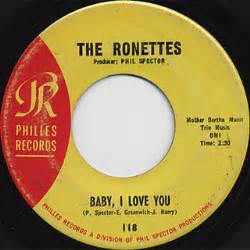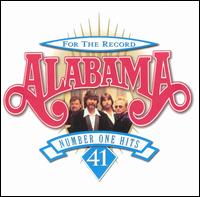Related Research Articles

Alabama is an American country music band formed in Fort Payne, Alabama, in 1969. The band was founded by Randy Owen and his cousin Teddy Gentry. They were soon joined by another cousin, Jeff Cook. First operating under the name Wildcountry, the group toured the Southeast bar circuit in the early 1970s, and began writing original songs. They changed their name to Alabama in 1977 and following the chart success of two singles, were approached by RCA Records for a recording deal.

"I Will Always Love You" is a song written and originally recorded in 1973 by American singer-songwriter Dolly Parton. Written as a farewell to her business partner and mentor Porter Wagoner, expressing Parton's decision to pursue a solo career, the country single was released in 1974. The song was a commercial success for Parton, twice reaching the top spot of the US Billboard Hot Country Songs chart: first in June 1974, then again in October 1982, with a re-recording for The Best Little Whorehouse in Texas soundtrack.
The Adult Contemporary chart is published weekly by Billboard magazine and lists the most popular songs on adult contemporary radio stations in the United States. The chart is compiled based on airplay data submitted to Billboard by stations that are members of the Adult Contemporary radio panel. The chart debuted in Billboard magazine on July 17, 1961. Over the years, the chart has gone under a series of name changes, being called Easy Listening(1961–1962; 1965–1979), Middle-Road Singles(1962–1964), Pop-Standard Singles(1964–1965), Hot Adult Contemporary Tracks(1979–1982) and Adult Contemporary(1983–present) The current number-one song on the chart is "Flowers" by Miley Cyrus.

"I Can't Stop Loving You" is a popular song written and composed by country singer, songwriter, and musician Don Gibson, who first recorded it on December 3, 1957, for RCA Victor Records. It was released in 1958 as the B-side of "Oh, Lonesome Me", becoming a double-sided country hit single. At the time of Gibson's death in 2003, the song had been recorded by more than 700 artists, most notably by Ray Charles, whose recording reached No. 1 on the Billboard chart.
"Heartaches by the Number" is a popular country song written by Harlan Howard, and published in 1959. The sheet music was a best seller in both the US and Britain in January 1960.

"Baby, I Love You" is a song originally recorded by the Ronettes in 1963 and released on their debut album Presenting the Fabulous Ronettes (1964). The song was written by Jeff Barry, Ellie Greenwich, and Phil Spector, and produced by Spector.

"Silly Love Songs" is a song by the British–American rock band Wings that was written by Paul and Linda McCartney. The song first appeared in March 1976 on the album Wings at the Speed of Sound, then it was released as a single backed with "Cook of the House" on 1 April in the US, and 30 April in the UK. The song, which features disco overtones, was written in response to music critics accusing McCartney of predominantly writing "silly love songs" and "sentimental slush"; however, McCartney has since clarified that the song was actually directed to John Lennon who accused him of writing such songs.

Hello, I'm Dolly is the debut studio album by American singer-songwriter Dolly Parton. It was released on September 18, 1967, by Monument Records. The album was produced by Fred Foster. It peaked at number 11 on the Billboard Top Country Albums chart. The album spawned two top 40 hits, "Dumb Blonde" and "Something Fishy", which peaked at numbers 24 and 17, respectively.

For the Record: 41 Number One Hits is a two-disc, 44-track greatest hits package released by the American country music band Alabama.

"I Love a Rainy Night" is a song co-written and recorded by American country music artist Eddie Rabbitt. It was released in November 1980 as the second single from his album Horizon. It reached number one on the Hot Country Singles, Billboard Hot 100, and Adult Contemporary Singles charts in early 1981. It was written by Rabbitt, Even Stevens, and David Malloy.

"Crying Time" is a song from 1964 written and originally recorded by the American country music artist Buck Owens. It gained greater success in the version recorded by Ray Charles, which won two Grammy Awards in 1967. Numerous other cover versions have been performed and recorded over the intervening years.
The discography of Buck Owens, an American country music artist, consists of 39 studio albums, 16 compilation albums, 9 live albums, 97 singles, and 12 B-sides. After recording under the name Corky Jones and releasing a string of singles in the mid-1950s, Owens signed a recording contract with Capitol Records in February 1957.
"I Love You Because" is a song written and recorded by country music singer and songwriter Leon Payne in 1949. The song has been covered by several artists throughout the years, including hit cover versions by Al Martino in 1963 and Jim Reeves in 1964.

The singles discography of Elvis Presley began in 1954 with the release of his first commercial single, "That's All Right". Following his regional success with Sun Records, Presley was signed to RCA Victor on November 20, 1955. Presley's first single with RCA, "Heartbreak Hotel", was a worldwide hit, reaching the No. 1 position in four countries and the top 10 in many other countries. Other hit singles from the 1950s include "Don't Be Cruel", "Hound Dog", "Love Me Tender", "Too Much", "All Shook Up", "(Let Me Be Your) Teddy Bear", "Jailhouse Rock", "Don't", "Hard Headed Woman" and "A Big Hunk o' Love". On March 24, 1958, Presley entered the United States Army at Memphis, Tennessee, and was stationed in Germany. He left active duty on March 5, 1960.

The singles discography of American country artist Dottie West contains 59 singles released as a solo artist, 12 singles released as a collaborative artist, 3 promotional singles and 1 other charting song. West signed with RCA Victor Records in 1963, having her first Top 40 hit the same year. It was followed in 1964 by "Love Is No Excuse", a duet with Jim Reeves that became West's first top 10 hit. In 1964, she also released "Here Comes My Baby". The song reached number 10 on the Billboard Hot Country Singles chart and became the first song by a female country artist to win a Grammy award. From her 1966 album, West issued four singles, including the top 10 hits "Would You Hold It Against Me" and "What's Come Over My Baby". Over the next two years she had major hits with "Paper Mansions", "Like a Fool", "Country Girl", and "Reno". In 1969, West collaborated with Don Gibson on "Rings of Gold", which reached number 2 on the Billboard country chart. In 1973, she released a single version of a commercial jingle originally used by The Coca-Cola Company. Entitled "Country Sunshine", the song became West's biggest hit, reaching number 2 on the country songs chart and number 49 on the Billboard Hot 100. The song also nominated her for her eleventh Grammy. After releasing the top 10 hit "Last Time I Saw Him" (1974), West's chart hits declined and she was dropped from RCA in 1976.

I Love You Drops is a studio album by American country singer-songwriter Bill Anderson. It was released in August 1966 on Decca Records and was produced by Owen Bradley. It was Anderson's fifth studio release and included three singles that became major hits on the Billboard country chart. The album would also become a success on the Billboard country albums list upon its release, becoming one of his most successful charting albums.

My Life/But You Know I Love You is a studio album by American country singer-songwriter Bill Anderson. It was released in June 1969 on Decca Records and was produced by Owen Bradley. It was Anderson's eleventh studio album to be issued during his musical career. The album's title was derived from its two singles of the same names. Both singles became major hits on the Billboard country chart.

The singles discography of American country singer-songwriter Bill Anderson contains 84 singles, three promotional singles, 6 other charted songs and four music videos. After signing to Decca Records in 1958, Anderson released a series of early singles that became hits, reaching the top ten and 20. This included "That's What It's Like to Be Lonesome" (1958), "The Tip of My Fingers" (1960) and "Po' Folks" (1961). The following year, he reached number one on the Billboard Country and Western Sides chart with "Mama Sang a Song." In 1963, Anderson released his most commercially successful single, "Still." The song was his second number one country single and his first top ten hit on the Billboard Hot 100, climbing to number eight. His follow-up single, "8×10" reached similar crossover success. Anderson released 11 more top ten country hits during the rest of the decade. This included the number one singles "I Get the Fever" (1966) and "My Life " (1969). He also had a number one hit with Jan Howard called "For Loving You" in 1968. Anderson also had top ten hits with "I Love You Drops" (1965), "Happy State of Mind" (1968) and a cover of "But You Know I Love You" (1969).

The discography of American country music artist Charley Pride contains 75 singles, one other charting song, two promotional singles, one featured single and 11 music videos. Pride signed his first recording contract with RCA Victor in 1966. His first two singles failed to become hits. His third single, "Just Between You and Me," became a hit when it reached the top ten of the country charts. Pride had several more top ten hits over the next several years until he had first chart-topper in 1969. The single, "All I Have to Offer You ," reached number one on the Billboard Hot Country Songs chart and spent 17 weeks charting. This was followed by five more number one hits, including "Is Anybody Goin' to San Antone." All of these singles also reached low-end positions on the Billboard Hot 100.
References
- ↑ "Top Country Singles - 1964" (PDF). The Billboard. December 26, 1964. p. 14.
- ↑ Joel Whitburn (1995). The Billboard Book of Top 40 Country Hits. Billboard Books. ISBN 0823076326.